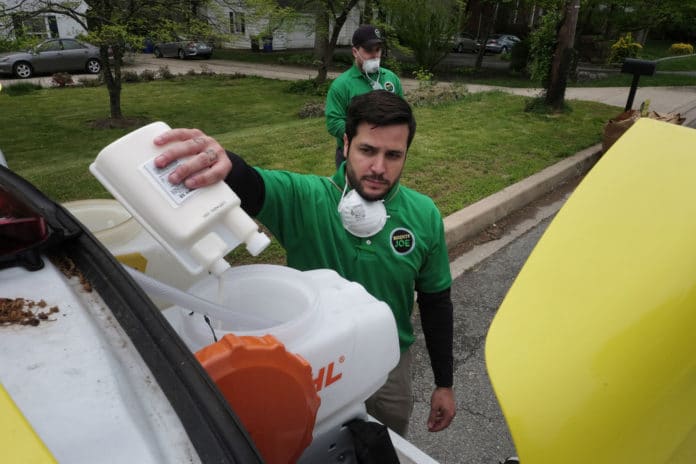Like a lot of pregnant women, Christine Kaineg carries a bag of supplies to get her through the day: Granola bars for hunger, a big bottle of Tums and a new staple – mosquito repellent.
Almost eight months pregnant, the mother-to-be has read about babies born with severe brain abnormalities in Brazil and other countries where birth defects have been linked to the mosquito-borne Zika virus.
With mosquito season underway, Kaineg is not taking any chances.
“I know it’s not in the area,” said Kaineg, who lives in Alexandria, Virginia, and works for a federal contractor. “But I also don’t want to be Patient A at such a critical time in my life.”
A lot of other East Coast residents are taking precautions: mosquito-control companies say business is booming.
Kevin Wilson, chief executive of Mosquito Joe, said the company’s locations in the South, where mosquito season started this winter, have reported more than a 50 percent jump in new customers compared with last year. Mosquito Joe franchises in the Washington, D.C., area have seen a 32 percent increase.
“The real sign will be in June and July, when the kids are out of school and start getting bit,” Wilson said. “That’s when we’ll see the uptick in volume.”
Public health officials say there is good reason for concern. The Asian tiger mosquito, the most common species in the Washington region, has been found to carry Zika in other countries. Moreover, experts say, mosquitoes rev up just as summer vacations are set to begin, and the Washington area typically sees robust travel to the Caribbean and Latin America – all places with locally transmitted Zika.
Although there have been no confirmed cases of mosquito-transmitted Zika in the continental United States, officials say, the start of mosquito season this month has significantly increased the chances.
Also, a string of rainy days in the East has left behind soggy yards – prime environments for female mosquitoes to lay hundreds of eggs each.
Health officials say they do not want to spread alarm, but they are urging pregnant women and everyone else to help prevent Zika by ridding their yards of standing water and wearing mosquito repellent daily.
“We don’t know if it will ever come to our local mosquito population, but we do know if it does come, bad things can happen – so we want to prepare for the worst,” said David Goodfriend, director of the Loudoun County, Virginia, Health Department. “If all that comes out of it is fewer people get bitten, that’s a good thing. And if it does come here, [prevention efforts] will be critical.”
As of May 11, the continental United States had 503 confirmed Zika cases, according to the Centers for Disease Control and Prevention. All involve people who traveled to Zika-affected countries.
Until this month, cases were not considered a public health threat because there were so few mosquitoes to spread the virus. Now that the Asian tiger mosquito has taken flight, concern is mounting, particularly for pregnant women.
Ulder Tillman, health officer for Montgomery County, Maryland, said the Washington region has the “setup for the likelihood of local transmission.”
“People shouldn’t panic, but they should follow our recommendations,” Tillman said. “Our only defense here is prevention.”
Tillman noted that there is no vaccine for Zika and that it can be transmitted sexually. Another complicating factor: About 80 percent of people with the virus do not feel sick, and those who get the most common symptoms – fever, rash, joint pain and conjunctivitis (pinkeye) – may not link them to Zika.
Rita Driggers, director of maternal fetal medicine at Sibley Memorial Hospital in Washington, said she sees women every day who have traveled to a Zika-affected country and are seeking ultrasounds to rule out abnormalities in their fetuses. She said many of her patients took “babymoons” – a last-hurrah big trip as a couple – in the fall, before many Americans were paying much attention to Zika.
“I have no doubt we’ll be seeing cases of locally transmitted Zika virus with this mosquito season,” said Driggers, who co-wrote a recent paper about Zika-related fetal brain abnormalities. “All it’s going to take is for one person with active Zika in their blood to get bitten by a mosquito, and that can start the spread.”
Driggers said she is particularly concerned “that there’s just a lot we don’t know about Zika,” including how accurate tests are for the virus in asymptomatic people and the risks to the fetus at different stages of development.
Based on how similar viruses have spread, health experts say, Hawaii, Texas and Florida are at the highest risk of experiencing Zika spread by local mosquitoes.
The key to how far or how quickly the virus could spread in local mosquitoes would depend on the number of pests, experts say.
Household members are urged to empty anything in their yards that holds water – flower pots, toys, folds in tarps – because the Asian tiger mosquito is known as a “container breeder” that lays its eggs close to its sources of blood in humans and their pets.
The message – or at least the mounting concern – is getting through.
Some pregnant women say they are taking precautions against Zika while trying not to become unduly anxious. Some have canceled trips down South and have stopped biking or walking to work to limit their time outdoors.
Kyra DeBlaker-Gebhard, who is eight months pregnant with her third child, said her doctor told her not to worry about Zika. But DeBlaker-Gebhard, an interior designer who lives on Capitol Hill in the District of Columbia, said she is checking her window screens, wearing mosquito repellent and scouring her yard for standing water.
“I’m suddenly aware of any bug flying around the house, thinking, ‘Is that a mosquito?’ ” DeBlaker-Gebhard said. “It concerns me that people are coming back from traveling [to Zika-affected countries], and now mosquitoes are around. What if a mosquito bites them and then bites me? It seems plausible.”
Jackie Ross, five months pregnant, said she and her Capitol Hill neighbors plan to hire a mosquito-control company to spray all of their yards. She said she also will wear long sleeves and pants all summer.
“Usually we have people over and hang out outside,” Ross said, “but I don’t think we’ll be doing that this summer.”








